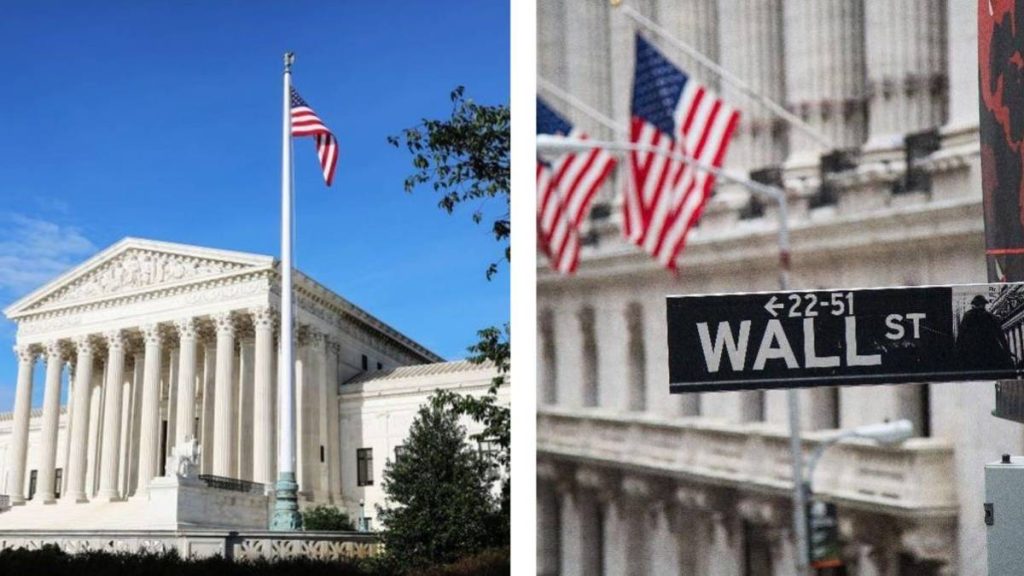Last Wednesday, November 29, the Supreme Court’s Conservative majority seemed like it would back a hedge fund manager on his case against the government.

He claimed that a top government agency disregarded his rights by relying on in-house judges and not a jury. From all indications, it looked like the court was ready to support George Jarkesy, who was challenging the Securities and Exchange Commission (SEC).
Experts believe that the hedge fund manager and former radio host’s appeal against the SEC could potentially affect essential areas, including government oversight of workplace regulations and environmental law.
POLL — Should Donald J. Trump Be Allowed to Run for Office?
This is not an isolated case. There are several others currently before the court. These cases play out against the backdrop of former president Donald Trump’s campaign for the White House, which hinges on a promise to eliminate the federal “deep state.”
The SEC fined George Jarkesy $300,000 in 2020 for securities fraud charges. The commission also ordered him to return almost $650,000 for misleading investors so he could make a profit. An administrative law judge at the agency delivered the punishment, and SEC officials later affirmed it.
However, Jarkesy didn’t let it go. He decided to appeal the punishment. Jarkesy also went after the process used in hearing his case. He claimed several case elements were wrong and that the SEC violated his 7th Amendment right to a jury trial.
ALSO READ: Is President Joe Biden a Conservative?
The New Orleans-based U.S. Court of Appeals for the 5th Circuit agreed with Jarkesy’s argument last year. Additionally, several conservative justices of the Supreme Court also seemed to embrace the argument.
“It does seem to me to be curious that… unlike most constitutional rights that you have right until the government decides that they don’t want you to have it,” Chief Judge John Roberts said. “That doesn’t seem to me the way the constitution normally works.”
The government is partly relying on a 1997 precedent from the high court. It differentiates between “private rights” involving individuals and “public rights,” which allows the executive branch to enforce laws on the public’s behalf.
According to the government’s attorney, securities fraud enforcement qualifies within public rights. So, in some cases, one could waive the 7th Amendment. However, some conservative court members didn’t buy that argument.
Justice Brett Kavanaugh asked, “What sense does it make to say the full Constitutional protection applies when a private is suing you, but we’re going to discard those core constitutional historic protections when the government comes at you?”
ALSO READ: Senator Lee Criticizes Capitol Riot Committee and Calls for Investigation
On the other hand, the liberal wing of the courts is more supportive of the government’s position. Justice Elena Kagan acknowledged that Congress had continued to expand the SEC’s power based on the economic situation and investors being targeted.
More so, Jarkesy alleged that Congress disregarded the Constitution by making it more difficult for a president to remove administrative law judges from office. Many Trump critics have been more interested in this.
They are worried that the Supreme Court could empower a future president to remove agency judges in politically charged cases. However, on Wednesday, November 29, the justices focused more on the Seventh Amendment question.
Jarkesy attended the hearing in person and commended the “fair and impartial hearing” from the Supreme Court. “We didn’t get that at the SEC,” he said in a statement. “It was quite the opposite.”
You Might Also Like:
- Gender Identity in Schools: Catholic School Contests Law Forcing the Hire of LGBTQ+ Teachers
- Michigan’s Reliance on Fossil Fuel Is About to Reduce Thanks to These Six Bills Gov. Whitmer Signed Into Law
- Trump’s Lawyer Claims That Special Counsel Refused to Find Evidence That Could Exonerate Him
- Kari Lake Loses Her Third Trial Linked to The 2022 Election
- Authorities Initiate an Investigation after Transgender was Found Bathing with High School Girls in Wisconsin
